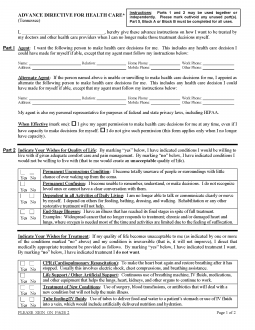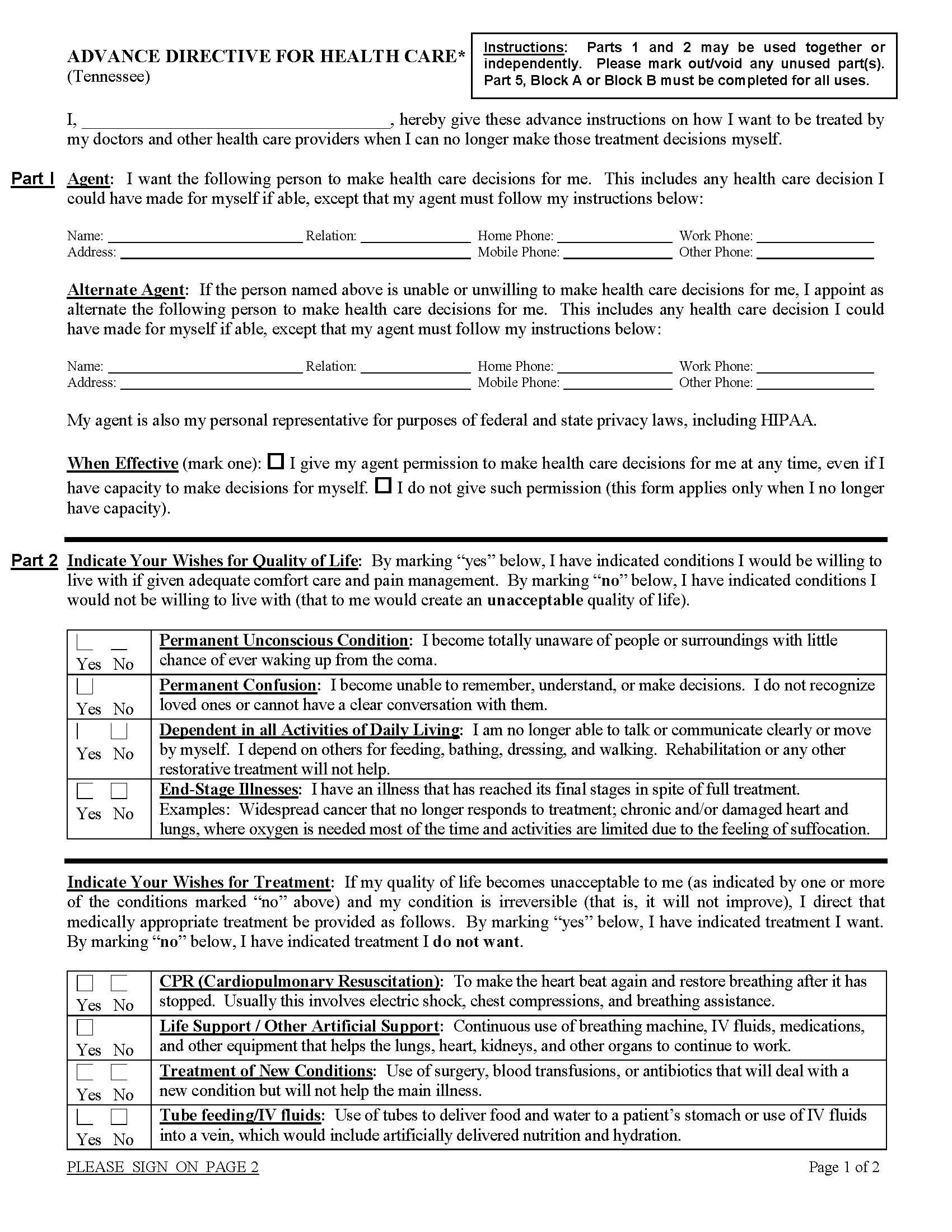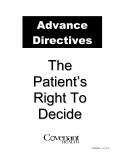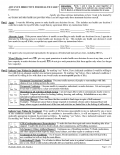Updated July 05, 2023
A Tennessee advance directive is a document used to inform medical staff on how to treat a person in case that person is incapacitated. An advance directive allows health planning by choosing an agent, selecting medical care, organ donation, and post-death instructions. Once the form has been signed by either two (2) witnesses or a notary public it can be used upon the incapacitation of the person.
Advance Directive Includes
- Part 1. Agent Designation (Power of Attorney)
- Part 2. Indicate Wishes for Quality of Life (Living Will)
- Part 3. Other Instructions
- Part 4. Organ Donation
- Part 5. Signature
Table of Contents |
Laws
Statute – Title 68, Chapter 11, Part 18 (Tennessee Health Care Directions Act)[1]
Signing Requirements – Two witnesses or a notary public.[2]
State Definition – “Advance directive” means an individual instruction or a written statement relating to the subsequent provision of health care for the individual, including, but not limited to, a living will or a durable power of attorney for health care.[3]
Versions (4)
Download: PDF
Download: PDF
Download: PDF
Download: PDF
How to Write
Download: PDF
Introduction
(1) Tennessee Principal Identity. The task of appointing a Medical Attorney-in-Fact or Health Care Agent in the State of Tennessee can be accomplished with the first portion of this directive. As a Patient in Tennessee, you can designate a Party of your choosing with the authority to make medical treatment decisions in your stead when you are unable to communicate them. Document your complete name as the Tennessee Principal to begin the process of granting such medical treatment decision-making authority to your Medical Attorney-in-Fact.

Part I. Agent
(2) Tennessee Health Care Agent Name. Make sure the Party you have decided to give the power to consult with Tennessee Doctors concerning your medical treatment is aware of this appointment, agrees to this responsibility, and is up-to-date on your medical preferences. The full name of your Tennessee Medical Attorney-in-Fact or Health Care Agent should be displayed for Reviewers in this paperwork.
(3) Relationship Of Tennessee Health Care Agent And Principal. Describe the relationship you hold with the Medical Attorney-in-Fact receiving the principal authority being granted.
(4) Tennessee Medical Attorney-in-Fact Contact Information.
(5) Tennessee Medical Attorney-in-Fact’s Phone Number. Every telephone number (i.e., work, home, cell) where the Tennessee Attorney-in-Fact can be reliably contacted should be documented
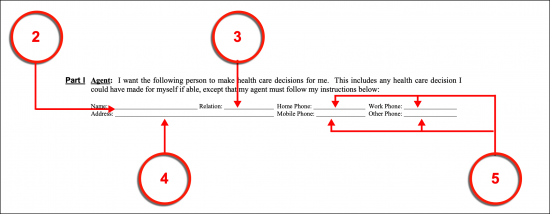
Alternate Agent
(6) Tennessee Alternate Agent Identity. Should the Tennessee Medical Attorney-in-Fact fail to assume this role when called upon or relinquish it after you have been incapacitated then you will be left without the medical representation you were counting on when unconscious with a severe medical condition. The result of this scenario may be handled now by naming someone who can be approached for this role and who bears the pre-authorization to wield the principal powers over your treatment this document bestows. Name this Party as your Tennessee Alternate Agent or Alternate Medical Attorney-in-Fact.
(7) Relation Of Tennessee Alternate Agent.
(8) Residential Address.
(9) Contact Telephone Numbers.
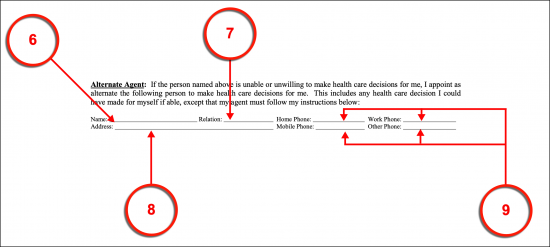
When Effective
(10) Tennessee Health Care Agent’s Access To Principal Powers. The Tennessee Attorney-in-Fact can receive your authorization to represent you in making health care or treatment decisions immediately and/or consult with Doctors in your name at any time or deliver your directives only upon the condition that you are incapacitated and unconscious while requiring treatment. Select the first checkbox statement to allow your Tennessee Medical Attorney-in-Fact to wield your health care decision making powers immediately or the second checkbox statement to document that these powers are granted only on the condition that you are not able to communicate your treatment directions to Tennessee Doctors when suffering a terminal condition or in a coma.

Part 2 Indicate Your Wishes For Quality Of Life
(11) Permanent Unconscious Condition. The ability to directly inform Tennessee Health Care Providers and your Medical Attorney-in-Fact of conditions that you can live with and those that your find completely intolerable. A list of such conditions is available for review along with Yes/No boxes. To declare that one of these medical conditions is acceptable, you must place a mark in the “Yes” box. If it is intolerable then, mark the “No” box. For instance, if you would be willing to live in a “Permanent Unconscious Condition,” mark the box labeled “Yes.” If you would not want your life unnaturally extended when in this condition, then you must place a mark in the “No” box. It should be noted that a diagnosis of being permanently unconscious means that no treatment currently available will be able to wake you.
(12) Permanent Confusion. Some neurodegenerative diseases and injuries to the brain can cause you to become unable to comprehend the world around you or the people in it. For instance, you may not be able to perform basic daily tasks or recognize those that you consider close (i.e., parents, siblings, spouses). Mark the box “Yes,” if you can accept living in this condition or the “No” box to indicate this falls below the minimum quality of life that you can accept.
(13) Dependent In All Activities Of Daily Living. Some medical conditions or treatments available may render you completely dependent on others for your day-to-day activities. This means that you will require a steady amount of care so that you can remain groomed, dressed, and fed. Select the box labeled “Yes” to indicate that you find this an acceptable quality of life or the “No” box to establish that you do not believe can tolerate being in this condition.
(14) End-Stage Illness. The end-stage of an illness can be a traumatic and sometimes lengthy event that can be painful. Select the “Yes” box to indicate that you do not believe your quality of life will be intolerable under these circumstances. If you do not wish the quality of your life to continue to deteriorate after being diagnosed as being in the end-stage of an illness and/or prefer a natural death, then select the box labeled “No”
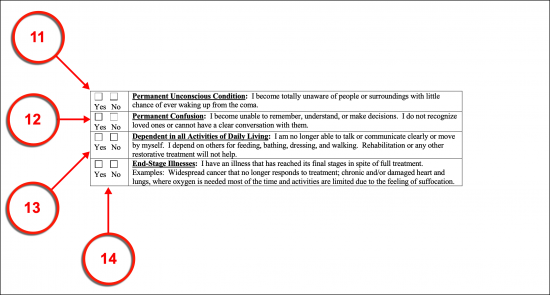
Your Wishes For Treatment
(15) CPR (Cardiopulmonary Resuscitation). The interventions or treatments Tennessee Physicians may instinctively administer to prolong your life can be requested or denied when you are suffering any of the quality of life conditions that you have marked as “No” (making them intolerable). If you have reached one of these conditions and you suffer cardiopulmonary failure, then you can either approve of CPR (cardiopulmonary resuscitation) being administered in an attempt to revive you by marking the “Yes” box or inform Tennessee Responders and Health Care Providers that you would not wish CPR administered by marking the “No” box
(16) Life Support/Other Artificial Support. If you wish to be placed on life-support or otherwise have your life medically maintained under any circumstances, then select the “Yes” box. If you only wish your life extended artificially for conditions with a “Yes” marked in the previous table then select the “No” box.
(17) Treatment Of New Condition. You may contract a new medical condition or injury while suffering from one of the medical conditions listed in the table above. If you wish any such condition to be medically treated even while enduring one of the traumatic diagnoses above, then mark the “Yes” box. If not, then select the box labeled “No.”
(18) Tube Feeding/IV Fluids. Tennessee Health Care Providers will generally monitor and, when necessary, maintain a Patient’s nutrition and hydration levels to as healthy a level as possible. If you wish to authorize the maintenance of your nutrition and hydration levels whenever needed even if this must be accomplished artificially, then select the “Yes” box. If, however, you do not wish to receive tube feedings (where you are connected to a machine that delivers nourishment through a tube) when enduring one of the qualities of life conditions you marked as unacceptable then mark the box labeled “No.”
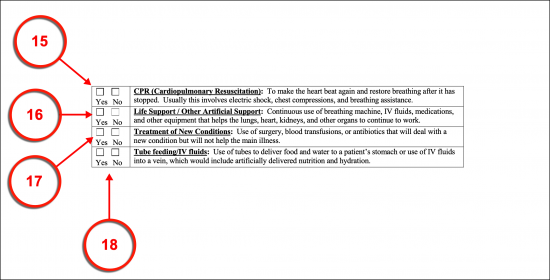
Part 4 Other Instructions
(19) Tennessee Declarant Treatment Instructions. This document must act as a complete representation of the decisions your Medical Attorney-in-Fact is authorized to make in your name, the limitations you wish placed on these powers, your treatment expectations or instructions, and your post-death preferences or instructions. Use the space provided for this purpose. More room is available by inserting additional lines or continuing on another page that is physically attached to this paperwork (by the time you sign it).

Part 4 Organ Donation
(20) Volunteering Anatomical Gifts. If you have decided to be a Tennessee Organ Donor upon death, then you can document this intention with this directive. To do so, simply mark the checkbox corresponding to the donation you wish to make. You may donate “Any Organ/Tissue,” your “Entire Body,” or only organs and tissues that you name in the space provided.
(21) Dismissing Organ Donation. If you have decided not to be a Tennessee Organ Donor, then select the box “No Organ/Tissue Donation.”
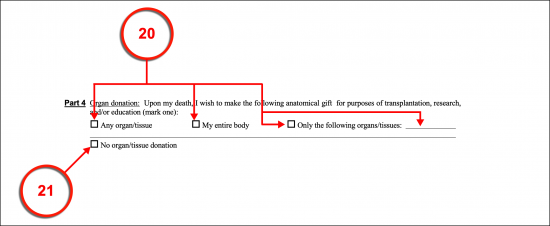
Signature
(22) Tennessee Patient. To issue the above statements as your appointment of a Medical Attorney-in-Fact and as your health care directives in the State of Tennessee, you must sign your name. Perform this task under the observance of either two Witnesses or a registered Notary Public.
(23) Tennessee Patient’s Signature Date. The current date should be used to inform Tennessee Health Care Providers and any other Party reviewing this document as to when you signed your name and formally issued this directive.

Block A Witness
(24) Signature Of Witness Number 1. Two Witnesses will be needed to verify your signature if you have decided not to use a Notary Public. The first of these Witnesses should read both the statements made in Block A then sign his or her name in the area reserved for Witness Number 1.
(25) Signature Of Witness Number 2. The second Witness in attendance should sign his or her name to testify that both statements in Block B are correct. He or she will have a Witness 2 line to use for this purpose.
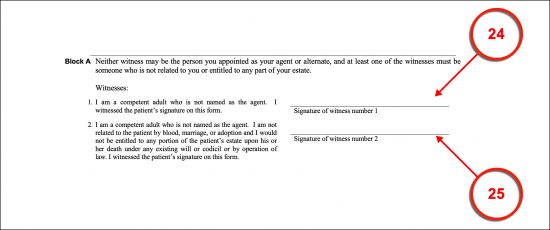
Block B Notary Public
(26) Notarization. If you have decided not to use two Witnesses, then the Notary Public overseeing your signing as the Tennessee Patient (Principal or Declarant) will subject this document and your signature to the process of notarization. Proof of this process will be found in Block B once the Notary Public has completed it.
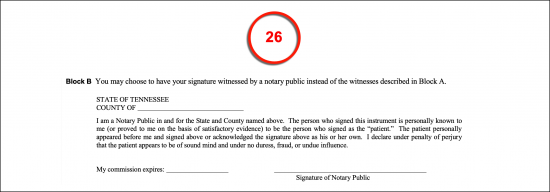
Related Forms
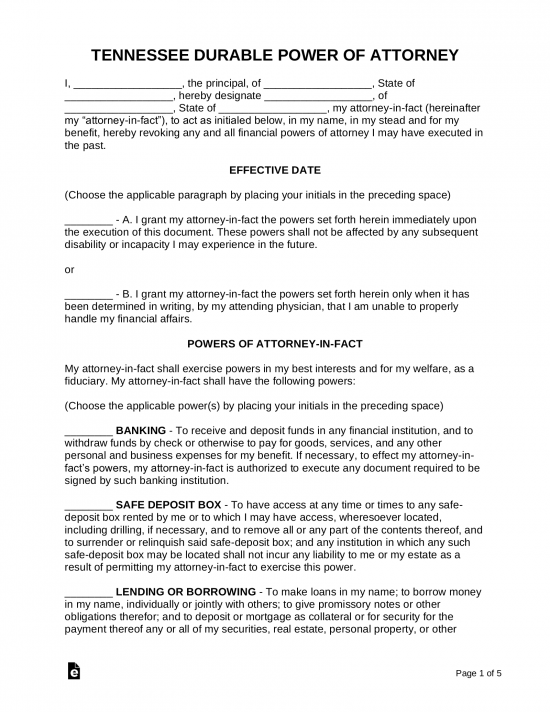 Durable Financial Power of Attorney
Durable Financial Power of Attorney
Download: PDF, MS Word, OpenDocument
Download: PDF, MS Word, OpenDocument
Sources
- Title 68, Chapter 11, Part 18 (Tennessee Health Care Directions Act)
- § 68-11-1803(b)
- § 68-11-1802(a)(1)

